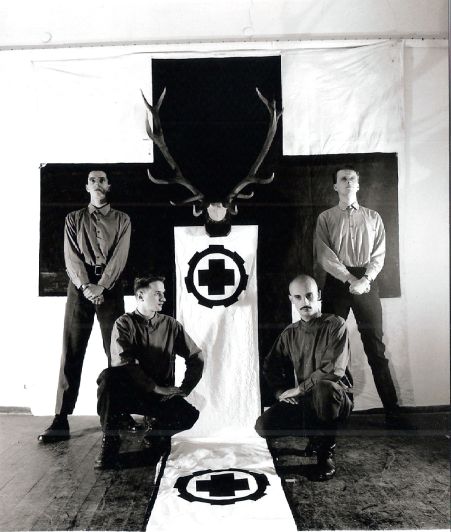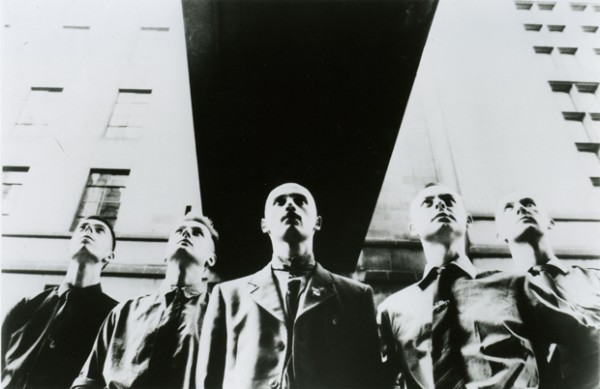|
Party Songs (Laibach Album)
''Party Songs'' is an EP by Neue Slowenische Kunst industrial/avant-garde group Laibach. It contains three versions of the song "Honourable, Dead or Alive, When Following the Revolutionary Road", as well as two versions of North Korean pop song "We Will Go To Mount Paektu" and a live recording of all-Korean folk song "Arirang" . The songs are a collaboration with Boris Benko from Slovenian electronic band Silence. The song "Honourable, Dead or Alive, When Following the Revolutionary Road" is a re-interpretation of an aria from the Korean revolutionary opera '' Tell O' The Forest!'', one of five famous revolutionary operas in the DPRK, "written and produced under the guidance of the Dear Leader Kim Jong-il." It was "prepared for the 2015 Liberation Day concert in Ponghwa Theatre in Pyongyang, but deemed too 'confusing' by the North Korean hosts and struck from the concert repertoire." Track listing #Honourable, Dead or Alive, When Following the Revolutionary Road (Arduous March ... [...More Info...] [...Related Items...] OR: [Wikipedia] [Google] [Baidu] |
Laibach (band)
Laibach () is a Slovenian avant-garde music group associated with the industrial, martial, and neo-classical genres. Formed in the mining town of Trbovlje (at the time in Yugoslavia) in 1980, Laibach represents the musical wing of the Neue Slowenische Kunst (NSK) collective, a group which Laibach helped found in 1984. "Laibach" is the German historical name for the Slovenian capital Ljubljana, itself an oblique reference to the Nazi occupation of Slovenia in World War II. From the early days, the band was subject to controversies and bans due to their elaborate use of iconography with ambiguously repugnant parodies and pastiches of elements from totalitarianism, nationalism and militarism, a concept they have preserved throughout their career. Censored and banned in Socialist Yugoslavia and receiving a kind of dissident status, the band embarked on international tours and gradually acquired international fame. After Slovenia became independent in 1991, Laibach's status in the ... [...More Info...] [...Related Items...] OR: [Wikipedia] [Google] [Baidu] |
2019 Albums
The following is a list of albums, EPs, and mixtapes released in 2019. These albums are (1) original, i.e. excluding reissues, remasters, and compilations of previously released recordings, and (2) notable, defined as having received significant coverage from reliable sources independent of the subject. For additional information about bands formed, reformed, disbanded, or on hiatus, for deaths of musicians, and for links to musical awards, see 2019 in music. First quarter January February March Second quarter April May June Third quarter July August September Fourth quarter October November December References {{DEFAULTSORT:2019 albums Albums An album is a collection of audio recordings issued on compact disc (CD), vinyl, audio tape, or another medium such as digital distribution. Albums of recorded sound were developed in the early 20th century as individual 78 rpm records col ... 2019 ... [...More Info...] [...Related Items...] OR: [Wikipedia] [Google] [Baidu] |
Laibach (band) Albums
Laibach () is a Slovenian and Yugoslav avant-garde music group associated with the industrial, martial, and neo-classical genres. Formed in the mining town of Trbovlje in 1980, Laibach represents the musical wing of the Neue Slowenische Kunst (NSK) collective, a group which Laibach helped found in 1984. From the early days, the band was subject to controversies and bans due to their use of iconography with parodies and pastiches of elements from totalitarianism, nationalism and militarism, a concept they have preserved throughout their career. Censored and banned in Socialist Yugoslavia and receiving a kind of dissident status, the band embarked on international tours and gradually acquired international fame, which led to wider acceptance in Yugoslavia. After Slovenia became independent in 1991, Laibach's status in the country has turned from rejection to promotion into a national cultural icon. Early Laibach albums were pure industrial, with heavy rhythms and roaring vo ... [...More Info...] [...Related Items...] OR: [Wikipedia] [Google] [Baidu] |
Pyongyang
Pyongyang (, , ) is the capital and largest city of North Korea, where it is known as the "Capital of the Revolution". Pyongyang is located on the Taedong River about upstream from its mouth on the Yellow Sea. According to the 2008 population census, it has a population of 3,255,288. Pyongyang is a directly administered city () with equal status to North Korean provinces. Pyongyang is one of the oldest cities in Korea. It was the capital of two ancient Korean kingdoms, Gojoseon and Goguryeo, and served as the secondary capital of Goryeo. Much of the city was destroyed during the First Sino-Japanese War, but it was revived Korea under Japanese rule, under Japanese rule and became an industrial center. Following the establishment of North Korea in 1948, Pyongyang became its ''de facto'' capital. The city was again devastated during the Korean War, but was quickly rebuilt after the war with Soviet Union, Soviet assistance. Pyongyang is the political, industrial and transport ... [...More Info...] [...Related Items...] OR: [Wikipedia] [Google] [Baidu] |
Ponghwa Art Theatre
The Ponghwa Art Theatre is a theatre located in Pyongyang, North Korea. See also * List of theatres in North Korea This is a list of theaters in North Korea. * April 25 House of Culture * Central Youth Hall * East Pyongyang Grand Theatre * Hamhung Grand Theatre * International Cinema Hall * Kalma Theatre * Mansudae Art Theatre * Mansudae People's Theatr ... References Theatres in North Korea Buildings and structures in Pyongyang {{Theatre-struct-stub ... [...More Info...] [...Related Items...] OR: [Wikipedia] [Google] [Baidu] |
National Liberation Day Of Korea
The National Liberation Day of Korea is a holiday celebrated annually on 15 August in both South and North Korea. It commemorates Victory over Japan Day, when the United States and the Soviet Union liberated Korea from 35 years of Japanese rule. Etymology In South Korea it is known as ''Gwangbokjeol'' (; ), and is one of the public holidays in South Korea. In North Korea it is known as ''Chogukhaebangŭi nal'' (; ), and is also one of the public holidays in North Korea. The name ''Gwangbokjeol'' is composed from the Korean words 광 (gwang), meaning “light”; 복 (bok), meaning “restoration”; and 절 (jeol), meaning “holiday”. The word “restoration” is used rather than the word for “independence”, 독립 (dongnip), in order to illustrate how Korea had been a nation for centuries prior to Japanese rule. History The day marks the annual anniversary of the announcement that Japan would unconditionally surrender on August 15, 1945. All forces of the Imper ... [...More Info...] [...Related Items...] OR: [Wikipedia] [Google] [Baidu] |
Kim Jong-il
Kim Jong-il (; ; ; born Yuri Irsenovich Kim;, 16 February 1941 – 17 December 2011) was a North Korean politician who was the second supreme leader of North Korea from 1994 to 2011. He led North Korea from the 1994 death of his father Kim Il-sung, the first Supreme Leader, until his own death in 2011, when he was succeeded by his son, Kim Jong-un. In the early 1980s, Kim had become the heir apparent for the leadership of the Democratic People's Republic of Korea (DPRK) and assumed important posts in the party and army organs. Kim succeeded his father and DPRK founder Kim Il-sung, following the elder Kim's death in 1994. Kim was the General Secretary of the Workers' Party of Korea (WPK), WPK Presidium, Chairman of the National Defence Commission (NDC) of North Korea and the Supreme Commander of the Korean People's Army (KPA), the fourth-largest standing army in the world. Kim ruled North Korea as a repressive and totalitarian dictatorship. Kim assumed leadership duri ... [...More Info...] [...Related Items...] OR: [Wikipedia] [Google] [Baidu] |
Korean Revolutionary Opera
Korean revolutionary opera () is a tradition of revolutionary opera in North Korea based on that of China during the Cultural Revolution. It is characterized by a highly melodramatic style and reoccurring themes of patriotism and glorification of ''Juche'', President Kim Il-sung, and the working people, as well as a focus on socialist realist themes. Composers of North Korean revolutionary opera are employed by the North Korean government and the fundamental principles of North Korean revolutionary opera were dictated by Kim Jong-il in his speech (later transcribed into a book) ''On the Art of Opera''. History North Korean revolutionary opera was preceded by the spread of propaganda songs that praised Kim Il-sung and the nation, which itself replaced p'ansori – traditional Korean theatrical song. North Korean revolutionary opera was highly influenced by the original form of revolutionary opera developed as part of the Chinese Cultural Revolution, including such works as ''Tak ... [...More Info...] [...Related Items...] OR: [Wikipedia] [Google] [Baidu] |
Avant-garde Music
Avant-garde music is music that is considered to be at the forefront of innovation in its field, with the term "avant-garde" implying a critique of existing aesthetic conventions, rejection of the status quo in favor of unique or original elements, and the idea of deliberately challenging or alienating audiences. Avant-garde music may be distinguished from experimental music by the way it adopts an extreme position within a certain tradition, whereas experimental music lies outside tradition. Distinctions Avant-garde music may be distinguished from experimental music by the way it adopts an extreme position within a certain tradition, whereas experimental music lies outside tradition. In a historical sense, some musicologists use the term "avant-garde music" for the radical compositions that succeeded the death of Anton Webern in 1945,Paul Du Noyer (ed.), "Contemporary", in the ''Illustrated Encyclopedia of Music: From Rock, Pop, Jazz, Blues and Hip Hop to Classical, Folk, Worl ... [...More Info...] [...Related Items...] OR: [Wikipedia] [Google] [Baidu] |
Silence (band)
Silence is a Slovene electronic, synthpop and soundtrack music composing duo consisting of Boris Benko (singer and songwriter) and Primož Hladnik (keyboards and arrangements). Their fanbase and their tours are currently limited to Slovenia, Germany and parts of Eastern Europe. Outside the region, the band is probably mostly known for the album " Vain, A Tribute To A Ghost" and their collaboration with Laibach on the album Volk in 2006. The music is characterized by melancholy, experimental sounds and vocal arrangements as well as meticulous production. The band is also known to incorporate various live instruments in their recordings, such as the piano, violin, viola, double bass, cello, valiha and other. The duo is recognized for their vast involvement in music writing for contemporary plays in Slovenian theater. Usually they will tour with the cast, or even be part of it, and perform the music live. "Musicians from the End of the World" ("''Glasbenika s konca sveta''"), di ... [...More Info...] [...Related Items...] OR: [Wikipedia] [Google] [Baidu] |
Arirang
"Arirang" (; ) is a Korean folk song. There are about 3,600 variations of 60 different versions of the song, all of which include a refrain similar to "''Arirang, arirang, arariyo'' ()". It is estimated the song is more than 600 years old. "Arirang" is included twice on the UNESCO Intangible Cultural Heritage list. South Korea successfully submitted the song for inclusion on the UNESCO list in 2012. North Korea also successfully submitted the song for inclusion in 2014. In 2015, the South Korean Cultural Heritage Administration added the song to its list of important intangible cultural assets. The song is sung today in both North and South Korea, and represents the symbol of unity in the region that is divided by the Korean War. History Origin and etymology It is believed that "Arirang" originated from Jeongseon, Gangwon Province. "Arirang" as a term today is ambiguous in meaning, but some linguists have hypothesized that "Ari" (아리) meant "beautiful" and "rang" (랑) ... [...More Info...] [...Related Items...] OR: [Wikipedia] [Google] [Baidu] |




.jpg)
